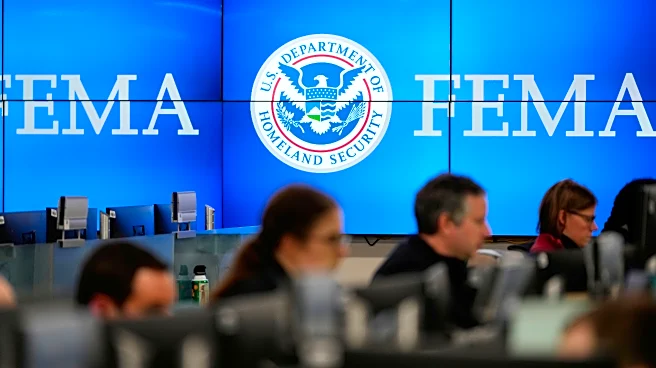What's Happening?
Latvia has announced its intention to become the 60th nation to sign the Artemis Accords, a set of international principles led by NASA to guide peaceful space exploration. This announcement was made at the end
of October, marking Latvia as the fourth country to join the accords that month, alongside the Philippines, Malaysia, and Hungary. The Artemis Accords were established in 2020 by NASA, the U.S. State Department, and seven other founding nations, aiming to promote responsible and sustainable exploration of the moon and deep space. Latvian officials expressed pride in joining a group of nations committed to these principles, emphasizing their active participation in the global space community. The accords are inspired by the 1967 Outer Space Treaty, which sought to foster peaceful cooperation in space.
Why It's Important?
Latvia's accession to the Artemis Accords signifies a growing international consensus on the importance of peaceful and cooperative space exploration. This move enhances Latvia's role in the global space community, potentially opening up new opportunities for collaboration and innovation in space technology and research. For the U.S., the expansion of the accords strengthens international partnerships and supports NASA's long-term goals of returning humans to the moon and establishing a permanent presence there. The inclusion of more countries in the accords also helps ensure that space exploration remains transparent and sustainable, reducing the risk of conflicts over space resources and activities.
What's Next?
With Latvia's announcement, a formal signing ceremony is expected to take place once the U.S. government reopens, as the current shutdown has delayed official proceedings. As more countries join the Artemis Accords, there may be increased collaboration on space missions and technology development. NASA is preparing for the launch of Artemis 2, scheduled for February 2026, which will be the first mission to fly astronauts to the moon since 1972. This will be followed by Artemis 3, targeted for 2027 or 2028, aiming to land astronauts on the lunar surface. These missions are part of a broader effort to establish a sustainable human presence on the moon.
Beyond the Headlines
The expansion of the Artemis Accords highlights the ethical and legal dimensions of space exploration, emphasizing the need for international cooperation to prevent militarization and ensure equitable access to space resources. As more nations commit to these principles, there may be long-term shifts in global space policy, fostering a collaborative environment that prioritizes scientific advancement and peaceful exploration over competitive pursuits.











